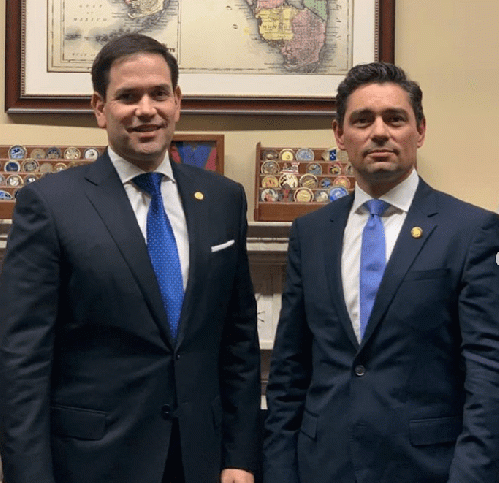With Lopez under house arrest and unable to maneuver internationally, Vecchio's days as "number two" were finally over. From that moment, he began to behave as the leader of Venezuela's opposition in the US, embarking on a concerted effort to convince top US officials that support for Popular Will was their best bet at achieving regime change.
Vecchio wrote about the lobbying blitz in his book: "I had to meet in the US Congress, the White House, the State Department, with professors in US universities, different ambassadors, [and] influential civil organizations in the states."
Courting Almagro, turning the OAS against VenezuelaIn March of 2015, the Obama Administration issued an executive order declaring Venezuela to be a "national security threat." Offering no evidence of the danger the country posed to the US public, the order criticized "the erosion of human rights guarantees [and the] persecution of political opponents" a clear reference to Lopez's arrest. The sanctions were subsequently spun out by the Obama and Trump administrations into an escalating series of unilateral coercive measures targeting the heart of Venezuela's economy.
While Vecchio lobbied US officials on regime change efforts, he paid special attention to Luis Almagro, the Uruguayan Foreign Minister who had assumed office as Secretary General of the Organization of American States (OAS) in May 2015. He wrote about having "a long conversation" with Almagro on Venezuela, "to take the opportunity to tell him who we are in Popular Will, that we believe in democracy, in an economy that isn't completely in the hands of the state, [and] that we believe in private incentives."
Vecchio said he and Almagro "began to prepare a report so that the OAS would at least highlight the topic of Venezuela and could start considering the possibility of applying the Inter-American Democratic Charter."

Vecchio coaching OAS Secretary General Luis Almagro. (Archive)
(Image by File Poto Venezuela Analysis) Details DMCA
One year later, Almagro presented a 114 page report on the situation in Venezuela and called for a referendum on Maduro's leadership, declaring "the situation facing Venezuela today is the direct result of the actions of those currently in power." Just as Vecchio hoped, Almagro invoked Article 20 of the Inter-American Democratic Charter, reserved for instances when the government of a member state "seriously impairs the democratic order".
Almagro's hostile obsession with Venezuela led the country to withdraw from the OAS at the end of April, 2017. Venezuela's then-Foreign Minister Delcy Rodriguez blasted the Secretary General as a "traitor of everything that represents the dignity of a Latin American diplomat."
But Vecchio referred to Almagro in glowing terms. "The Venezuelan people will never be able to thank him for his fight to restore democracy," he said of Almagro in his memoirs, "That's why I always tell him he's the most Venezuelan Uruguayan of all."
In the prologue to Vecchio's autobiography, Almagro credited the Venezuelan lawyer as an inspiration. "Carlos Vecchio was the first Venezuelan political leader that approached me about the subject of Venezuela after I assumed office as General Secretary of the OAS," he recalled.
Three years later, when the Trump Administration initiated a coup in Venezuela, Almagro ensured that the OAS recognized Guaido as the interim president of Venezuela and accepted his appointed representative to the group, Gustavo Tarre, in explicit violation of the organization's own charter.
Through Almagro, Vecchio had marched through an international institution and laid new groundwork for the US to intensify its pursuit of regime change in Caracas.
From regime change activist to US "ambassador"In January 2019, Vecchio's Popular Will party received the mandate it had been seeking to lead Venezuela.
The victory his party had achieved did not come through any popular vote, but thanks instead to the Trump Administration's unilateral recognition of Juan Guaido, the head of Venezuela's legally defunct National Assembly, as president of the country. Within days of the US formally recognizing Guaido on January 23rd, the White House welcomed Vecchio as Venezuela's new "ambassador" to Washington.
When Trump delivered his State of the Union Address address in early February and trumpeted his administration's decision to recognize Guaido, Vecchio was seated in the Capitol chamber as Florida Sen. Marco Rubio's guest of honor.

Vecchio with Florida Sen. Marco Rubio. (Archive)
(Image by File Poto Venezuela Analysis) Details DMCA
Next Page 1 | 2 | 3 | 4 | 5 | 6 | 7 | 8 | 9 | 10
(Note: You can view every article as one long page if you sign up as an Advocate Member, or higher).





